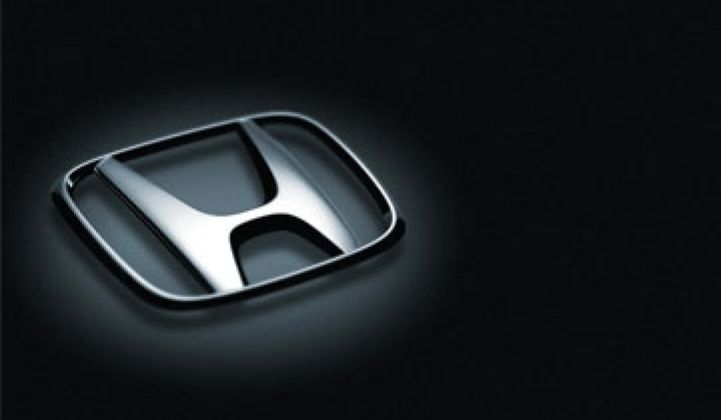Honda -- you probably drive one -- will announce plans to release plug-in hybrids and all-electric cars tomorrow, according to a report from the Nikkei Business Daily.
If so, it would make the party complete. Most of the other major car makers in the world -- Nissan, Toyota, Mitsubishi, Subaru, General Motors, Ford, Renault, Volkswagen, BMW -- have already detailed their plans for plug-ins and all-electrics. (Mitsubishi and Subaru have already come out with limited numbers of electric cars.) Then there are startups like Tesla Motors, Fisker Automotive, Think! (not to be confused with Wham!), Coda Automotive, BYD, etc.
Some manufacturers are more excited than others. Nissan predicts 10 percent of its cars will be all electric by 2020. Volkswagen, which will come out with an all-electric Audi in 2012 and a Volks in 2013, says it will achieve greater savings in fossil fuels through improved diesel engines. Overall, most of these established companies say that although electrics and plug-ins will only occupy a sliver of their overall production for years, the enthusiasm among consumers is definitely real and palpable. Consider this: how many articles have you read about the Nissan Leaf in the last year -- and how many have you read about the Nissan Altima?
"After Toyota's RAV4 announcement last week, Honda was the sole holdout in the no-EV crowd. This is the last shot in the first battle of the electric drivetrain wars, and the EV proponents have won a no-prisoners victory. Every major car manufacturer has a major plug-in launch coming in the next three years," according to Sam Jaffe, the research manager at IDC Energy Insights. "The next stage is to see who wins the technology bet: GM's EREV? Nissan's BEV? Toyota/Tesla's laptop battery-based system? Better Place's pervasive infrastructure network? Get your popcorn. It's going to be a lot of fun to watch."
It's also going to be interesting to see whose battery Honda chooses. Both Ford and GM have decided to power their cars with batteries made of cells from LG Chem. (Ford will get the complete battery pack from Compact Power, a subsidiary of LG Chem that makes its packs around cells from the parent company, while GM will buy cells from LG Chem and make packs on its own.) LG Chem is from South Korea -- not the most popular option for a Japanese car maker like Honda.
Panasonic supplies batteries to Tesla and Toyota. The electronics conglomerate also took a controlling interest in Sanyo. NEC is also a candidate -- they jointly developed the battery for the Leaf with Nissan.



